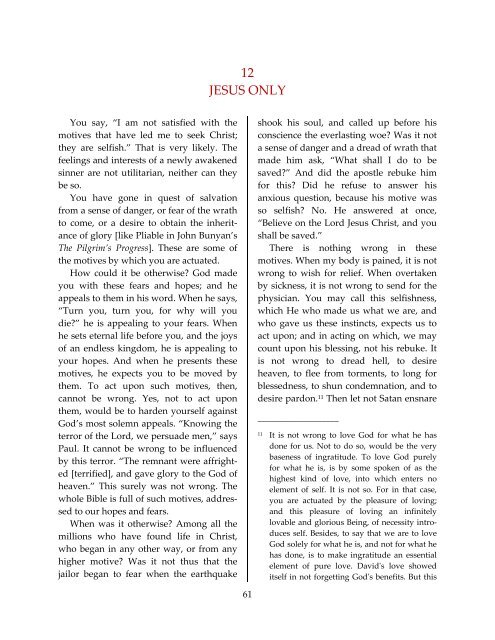God's Way of Peace by Horatius Bonar, D.D.
The seasoned Scottish pastor wrote this short devotional for those suffering from guilt, anxiety, or the consequences of sin. He writes with neither chastisement nor condemnation, but rather immediately directs his readers to Christ’s gift of salvation through his death and resurrection. Bonar reminds all that the Gospel offers hope for the sinner and comfort for the troubled, for God’s perfect, constant grace never fails those who accept it. From Bonar’s time to the present, people have found peace with God afresh through this book. Many people report having read it several times, and turning to it again and again when troubles arise. Kathleen O’Bannon CCEL Staff
The seasoned Scottish pastor wrote this short devotional for those suffering from guilt, anxiety, or the consequences of sin. He writes with neither chastisement nor condemnation, but rather immediately directs his readers to Christ’s gift of salvation through his death and resurrection. Bonar reminds all that the Gospel offers hope for the sinner and comfort for the troubled, for God’s perfect, constant grace never fails those who accept it. From Bonar’s time to the present, people have found peace with God afresh through this book. Many people report having read it several times, and turning to it again and again when troubles arise.
Kathleen O’Bannon
CCEL Staff
You also want an ePaper? Increase the reach of your titles
YUMPU automatically turns print PDFs into web optimized ePapers that Google loves.
GOD’S WAY OF PEACE<br />
12<br />
JESUS ONLY<br />
You say, “I am not satisfied with the<br />
motives that have led me to seek Christ;<br />
they are selfish.” That is very likely. The<br />
feelings and interests <strong>of</strong> a newly awakened<br />
sinner are not utilitarian, neither can they<br />
be so.<br />
You have gone in quest <strong>of</strong> salvation<br />
from a sense <strong>of</strong> danger, or fear <strong>of</strong> the wrath<br />
to come, or a desire to obtain the inheritance<br />
<strong>of</strong> glory [like Pliable in John Bunyan’s<br />
The Pilgrim’s Progress]. These are some <strong>of</strong><br />
the motives <strong>by</strong> which you are actuated.<br />
How could it be otherwise? God made<br />
you with these fears and hopes; and he<br />
appeals to them in his word. When he says,<br />
“Turn you, turn you, for why will you<br />
die?” he is appealing to your fears. When<br />
he sets eternal life before you, and the joys<br />
<strong>of</strong> an endless kingdom, he is appealing to<br />
your hopes. And when he presents these<br />
motives, he expects you to be moved <strong>by</strong><br />
them. To act upon such motives, then,<br />
cannot be wrong. Yes, not to act upon<br />
them, would be to harden yourself against<br />
God’s most solemn appeals. “Knowing the<br />
terror <strong>of</strong> the Lord, we persuade men,” says<br />
Paul. It cannot be wrong to be influenced<br />
<strong>by</strong> this terror. “The remnant were affrighted<br />
[terrified], and gave glory to the God <strong>of</strong><br />
heaven.” This surely was not wrong. The<br />
whole Bible is full <strong>of</strong> such motives, addressed<br />
to our hopes and fears.<br />
When was it otherwise? Among all the<br />
millions who have found life in Christ,<br />
who began in any other way, or from any<br />
higher motive? Was it not thus that the<br />
jailor began to fear when the earthquake<br />
shook his soul, and called up before his<br />
conscience the everlasting woe? Was it not<br />
a sense <strong>of</strong> danger and a dread <strong>of</strong> wrath that<br />
made him ask, “What shall I do to be<br />
saved?” And did the apostle rebuke him<br />
for this? Did he refuse to answer his<br />
anxious question, because his motive was<br />
so selfish? No. He answered at once,<br />
“Believe on the Lord Jesus Christ, and you<br />
shall be saved.”<br />
There is nothing wrong in these<br />
motives. When my body is pained, it is not<br />
wrong to wish for relief. When overtaken<br />
<strong>by</strong> sickness, it is not wrong to send for the<br />
physician. You may call this selfishness,<br />
which He who made us what we are, and<br />
who gave us these instincts, expects us to<br />
act upon; and in acting on which, we may<br />
count upon his blessing, not his rebuke. It<br />
is not wrong to dread hell, to desire<br />
heaven, to flee from torments, to long for<br />
blessedness, to shun condemnation, and to<br />
desire pardon. 11 Then let not Satan ensnare<br />
____________________<br />
11<br />
It is not wrong to love God for what he has<br />
done for us. Not to do so, would be the very<br />
baseness <strong>of</strong> ingratitude. To love God purely<br />
for what he is, is <strong>by</strong> some spoken <strong>of</strong> as the<br />
highest kind <strong>of</strong> love, into which enters no<br />
element <strong>of</strong> self. It is not so. For in that case,<br />
you are actuated <strong>by</strong> the pleasure <strong>of</strong> loving;<br />
and this pleasure <strong>of</strong> loving an infinitely<br />
lovable and glorious Being, <strong>of</strong> necessity introduces<br />
self. Besides, to say that we are to love<br />
God solely for what he is, and not for what he<br />
has done, is to make ingratitude an essential<br />
element <strong>of</strong> pure love. Davidʹs love showed<br />
itself in not forgetting Godʹs benefits. But this<br />
61

















